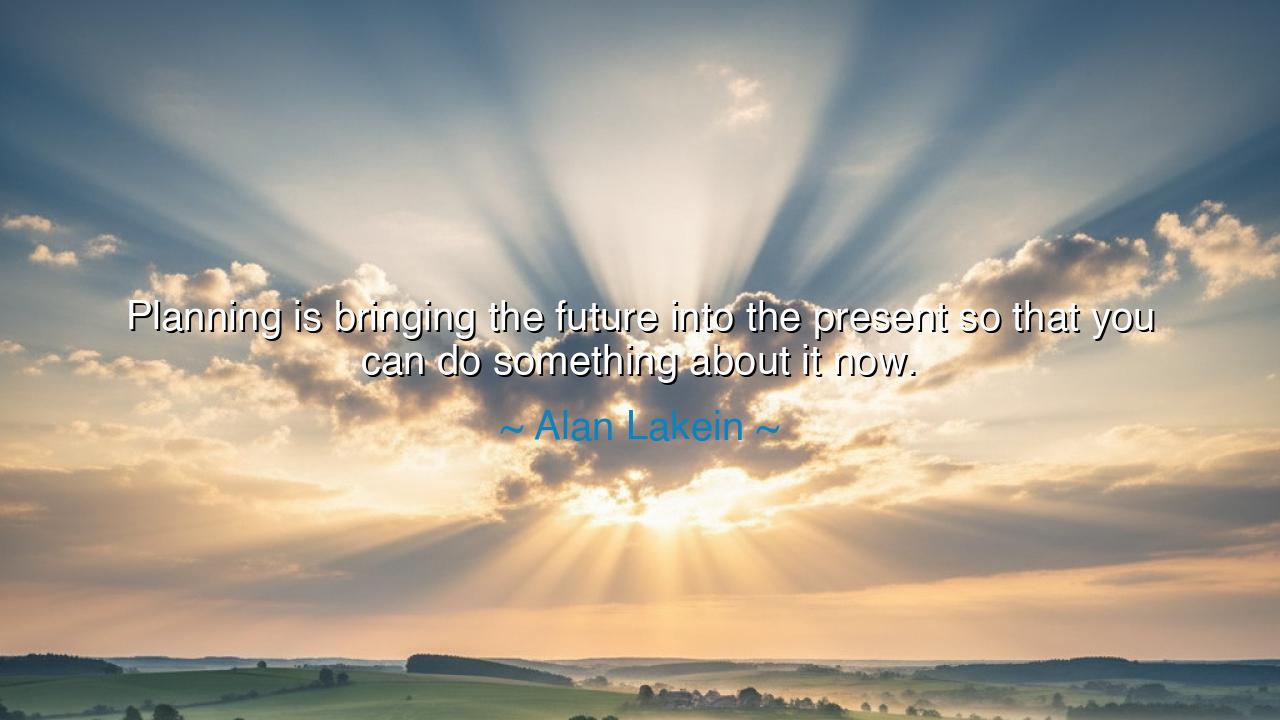
Planning is bringing the future into the present so that you can
Planning is bringing the future into the present so that you can do something about it now.






When Alan Lakein declared, “Planning is bringing the future into the present so that you can do something about it now,” he spoke of the immense power that lies in the act of foresight. In this single phrase, Lakein encapsulates a timeless truth: that the future, though unseen, is shaped by the choices and actions we take today. Planning is not just a task or a process; it is an art—a way of molding the unseen into something tangible, something actionable. It is through planning that we gain the ability to take control of the future, to prepare for what is to come by starting in the present.
The ancients understood the power of foresight well. Sun Tzu, in his great work The Art of War, emphasized the importance of strategy, of seeing the battlefield before it is even set. He knew that success in battle depended not on reacting to what was happening but on anticipating it. Planning allowed the great general to control the narrative of his battles, to foresee the moves of his enemies and to act decisively in the present. Sun Tzu’s philosophy was not one of passive waiting, but of proactive preparation. The same principle applies to our own lives—by bringing the future into the present, we can take action now that leads us to victory.
In the same vein, the story of Alexander the Great offers an example of someone who not only reacted to the events around him but actively planned for the future. His conquest of the Persian Empire was not an impulsive act, but the result of years of meticulous preparation. Alexander understood that victory was not won in the heat of the moment alone, but in the careful planning of resources, alliances, and strategies. He famously crossed the Hellespont into Asia, prepared for the long campaign ahead, knowing that success depended on his ability to anticipate not just the present conditions but the future challenges. Planning, for Alexander, was a way of turning uncertainty into something manageable, something within his grasp.
The Romans, too, exemplified this understanding of planning. Julius Caesar, in his military campaigns, always planned with foresight. He understood that to achieve the kind of greatness he sought, he needed to prepare for every possible outcome. From his crossing of the Rubicon to his campaigns in Gaul, Caesar's ability to plan ahead and act decisively made him one of history’s most successful leaders. He knew that by bringing the future into the present, he could shape the course of his destiny and secure his legacy. Caesar's story is a testament to the power of foresight and strategic action in shaping both the present and the future.
Lakein’s quote is also a reflection of the very essence of human progress. The building of great civilizations, the achievements of artists, scientists, and philosophers, all relied on the ability to plan—to take the future, with all its uncertainties, and make it something they could act upon. Leonardo da Vinci, for example, though a man of brilliant invention, was also a master of planning. His notebooks are filled with drawings and ideas for machines and inventions that were ahead of his time. Da Vinci understood that planning was not merely about preparing for what was to come but about creating the future—bringing those ideas from the realm of the impossible into something actionable in the present.
The lesson we take from Lakein's words and the ancients alike is this: to live with purpose, one must plan. It is not enough to simply react to life as it comes—true success, true progress, lies in the conscious effort to shape the future through action in the present. Planning allows us to anticipate the challenges we face and to take control of our destiny, rather than waiting for circumstances to dictate our path. It is a powerful tool, one that transforms uncertainty into something tangible, something within our power to influence.
So, in your own life, take the time to plan. Think not just of today but of tomorrow, and take the necessary steps to bring the future into the present. Whether it is in your personal goals, your career, or the way you engage with the world, planning gives you the power to shape your own fate. Just as Alexander, Caesar, and da Vinci did, you too can use foresight to turn what once seemed uncertain into something achievable. Remember, it is not enough to wait for the future to come to you—plan for it, shape it, and take action now to create the world you wish to live in. Through planning, you hold the key to transforming the unseen into the tangible, the impossible into the possible.






AAdministratorAdministrator
Welcome, honored guests. Please leave a comment, we will respond soon